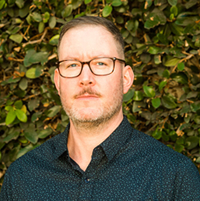Find a CBT Therapist
Search through our directory of local clinicians.
Jayson L. Mystkowski

Featured Therapist Interview
Jayson L. Mystkowski, Ph.D., (preferred pronouns: he/him/his) is Founder and Director of Cognitive Behavior Health Partners. He received a Ph.D. from UCLA’s Clinical Psychology program in 2003 and a B.A. Summa Cum Laude and Phi Beta Kappa in Psychology, with Departmental Honors, from Northwestern University in 1997. At UCLA, where he has been a Clinical Professor for over 10yrs in their Psychology Clinic, Dr. Mystkowski acquired a strong foundation in the application of behavior theories to the understanding and treatment of anxiety disorders while working with Michelle Craske.
His clinical training is diverse, with time spent on anxiety treatment studies at UCLA, practicum and post-doctoral training at the Greater Los Angeles Veterans Administration Hospital System, and an APA-accredited internship at UCLA’s Counseling and Psychological Services. After 15yrs as a licensed clinical psychologist and the Associate Clinical Director at Cognitive Behavior Associates in Beverly Hills, Dr. Mystkowski founded Cognitive Behavior Health Partners in 2019.
While trained as a generalist, Dr. Mystkowski mainly practices within a cognitive behavioral therapy (CBT) framework, including mindfulness-based cognitive therapy (MBCT), compassion-focused therapy (CFT), and acceptance and commitment therapy (ACT), specializing in the treatment of adults with anxiety (e.g., panic, worry, phobias, OCD, and PTSD) and mood disorders (e.g., depression), relational problems, and phase of life transitions. In addition, he has training in the psychological treatment of Irritable Bowel Syndrome (IBS), insomnia, and bipolar disorder, as well as an extensive background working with LGBTQ+ clients.
Dr. Mystkowski has flexible hours (including evenings and telehealth options), and is a Medicare, Lyra Health, and Advekit provider. Dr. Mystkowski is a Diplomate of the Academy of Cognitive and Behavioral Therapies (A-CBT), certified as a Cognitive-Behavioral Therapist.
First, we would like to know a little about your practice.
What are your personal strengths as a practitioner?
My most important strength as a practitioner is my eagerness to continue to expand my depth and breadth of empirically supported treatments by supervising advanced, clinical psychology graduate students. Their exposure to cutting-edge research findings in their graduate coursework and lessons learned from previous clinical placements fosters a dynamic learning environment that allows me and my students to mutually benefit throughout our supervision relationship, allowing us to maximize our potential in helping our clients.
What “tips” can you offer to colleagues just opening a practice?
Develop more than one niche specialty area (don’t just be a generalist), have a social media and web presence, and routinely collaborate with healthcare providers outside of psychology.
How do you remind your patients of their strengths during the therapy process?
I remind clients of their strengths by noting when actions and outcomes successfully map onto goals articulated in their treatment plans, as well as by framing perceived moments of relapse or failure as learning events, reminding clients that progress only approximates a straight line, and fostering self-compassion and a continued posture toward alleviating distress and interference in one’s life.
Are you involved in other types of professional activities in addition to your private practice?
I’ve been a clinical supervisor for clinical psychology graduate students at UCLA since my graduation in 2003 and have coordinated several continuing education offerings sponsored by my private practice settings.
We would also like to know a little about you personally.
Who was your mentor?
Michelle Craske.
When not practicing CBT, what do you do for fun?
Manage my dog’s Instagram account!
We are also interested in some of your views of CBT.
What do you think is the single most important thing CBT can do for your clients?
The most important thing CBT can do for clients is to embolden them to be assertive advocates for their mental healthcare, encouraging them to push their therapists to properly address their most valued goals, monitor progress on a regular basis, to have flexibility in utilizing evidence-based interventions, and to collaborate with other healthcare providers.
Where do you see the field of the behavioral therapies going over the next 3-5 years?
It is my hope that the field will continue to build upon the expansion of delivering cognitive-behavioral therapies via telehealth that we saw during the COVID-19 pandemic, to further help areas and populations that were previously neglected and underserved.
How do you use the local or social media to educate your community on the benefits of CBT?
I coordinate ABCT’s Monthly Mental Health Topic and post CBT-related content on my group private practice’s social media (e.g., Facebook, Instagram, and Twitter), as well as via email blasts to current and former clients, healthcare practitioners, and other colleagues in my professional network.
Finally, we would like to know your opinions about ABCT.
How long have you been a member of ABCT?
I became a student member of ABCT when I started graduate school in the Fall of 1997 and advanced to a full, professional member upon earning my Ph.D. in 2003.
What services do you consider the most valuable from ABCT?
The annual convention has long been a highly valued opportunity to connect with new and old colleagues, to foster brainstorming opportunities on clinical and research topics of interest, and to expand my clinical horizons with high-level educational offerings.
To see more about Dr. Mystkowski and Cognitive Behavior Health Partners, see https://cbhealthpartners.com/our-team
Thank you very much for taking the time to answer our questions!
